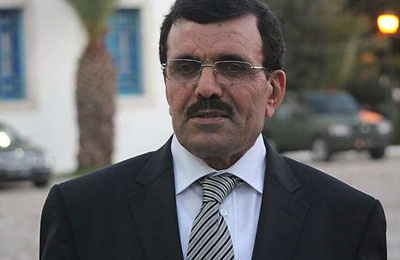
Tunisia committed to reform as economy slows
Tunis, October 21, 2013
Political unrest has hurt Tunisia's growth outlook but it will stay committed to cutting the state budget deficit next year, while relying on foreign aid to fill a large external financing gap, Prime Minister Ali Larayedh told Reuters.
After two murders of left-wing politicians triggered street protests, Tunisia this year slid into its worst political crisis since the overthrow of autocratic president Zine Al-Abidine Ben Ali in January 2011.
Under a deal between Larayedh's moderate Islamist Ennahda party and the opposition, the government has agreed to resign to make way within three weeks for a non-partisan administration that would rule until elections next year.
The political instability, as well as Europe's economic crisis, mean growth in Tunisia's gross domestic product is now expected to slow to 3 per cent in 2013, Larayedh said in an interview at the Reuters Middle East Investment Summit.
His statement marked the third time this year that the government cut its growth forecast; early this year it predicted 4.5 per cent and most recently, 3.6 per cent. Last year GDP expanded 3.6 per cent, too slowly to begin solving the problems of unemployment and poverty which fuelled the 2011 uprisings in Tunisia and other Arab states.
Slow growth is making it more politically painful for Tunisia to push through the economic reforms, especially cuts to state subsidies, which the International Monetary Fund and many private economists say are needed to strengthen the economy.
Also, since the shape of the next government is not yet clear, there is no guarantee that it will have the political will to push reforms. But the prime minister said he believed there was now enough understanding of the need for reform among Tunisian politicians across the spectrum for reform to continue under future governments.
"Investment law reforms, fiscal and subsidies reforms must continue in Tunisia in the next period," said Larayedh, 58, who was appointed in March and is a leading figure in Ennahda.
"The next government will continue reforms because without reforms we cannot achieve the goals of the Tunisian revolution and achieve high growth and provide jobs."
DEFICIT
Extra government spending on salaries will amount to 1 billion dinars ($610 million) in 2013, officials said last month, while annual state spending on subsidies has soared to 5.5 billion dinars this year from 1.5 billion dinars in 2010, before the ouster of Ben Ali.
Under pressure from its international lenders, the government said this month that it was moving ahead with austerity measures including a 5 per cent cut in public spending and a freeze on public sector wages in 2014.
The industry ministry has said subsidy payments to energy-intensive companies will be abolished in 2014. Other plans for next year include the imposition of a 10 per cent tax on exporting companies, which have been exempt from taxes, the government has said. This marks a major shift from Ben Ali's heavily export-focused economic model.
Such steps will allow the government to bring next year's budget deficit to below its previous forecast of 6.5 per cent of GDP, Larayedh said.
"Reforms will bear fruit by the end of next year and in 2015...That will enable us to control the deficit to 6 per cent next year." The government has projected a deficit of 7.4 per cent for this year.
FOREIGN LOANS
In addition to the state budget deficit, Tunisia is grappling with an external financing gap because of a large trade deficit. This contributed to the decision by Standard & Poor's in August to cut its long-term foreign and local currency sovereign credit ratings for Tunisia to B from BB-, with the outlook for them remaining negative.
Foreign exchange reserves slid to the equivalent of just 94 days of imports in June, though they have since rebounded modestly and, Larayedh said, are now at 104 days.
Tunisia's strategy appears to be to plug most of its twin deficits with foreign aid until a hoped-for return of political stability after next year's elections, and a recovery of the European economy, eventually boost capital flows into the country and narrow the trade deficit.
This strategy may succeed because foreign donors are keen to keep Tunisia stable; its 2011 uprising was the first in the Arab world, paving the way for the others. With a small population of 11 million, Tunisia is relatively easy to keep afloat.
But the government, which signed a $1.7 billion standby loan agreement with the IMF in April, nevertheless faces constant pressure to raise external financing. Larayedh estimated Tunisia's need for external loans would be about $3.3 billion in 2014, about the same level as this year.
He said the United States and France were expected to provide guarantees for loans totalling 820 million dinars next year, while the country would ask for a combined 1.3 billion dinars of loan guarantees from Japan and the European Union.
In July Tunisia's parliament passed a law allowing the state to issue its first sovereign Islamic bonds; this would help the country tap a huge pool of cash-rich Islamic funds in the Gulf. The government hoped to issue a $700 million sukuk by the end of this year.
But because political instability has distracted the government and raised the risk involved in any international debt sale, the sukuk issue now looks unlikely to proceed this year, bankers believe. - Reuters







